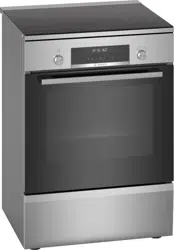Loading ...
Loading ...
Loading ...

en How it works
48
Food Accessories/cook-
ware
Shelf pos-
ition
Type of
heating
Searing
time in
mins
Temperature in
°C
Cooking
time in
mins
Turkey breast, boned, 6.5–
8.5cm thick, 1kg, well
done
Cookware without lid 2 6–8 120
1
140–180
Pork tenderloin steak, 5–
6cm thick, 1.5kg, well
done
Cookware without lid 2 6–8 85
1
150–210
Fillet of pork, whole Cookware without lid 2 4–6 85
1
75–100
Beef topside, 6–7cm thick,
1.5kg
Cookware without lid 2 6–8 100
1
160–220
Fillet of beef, 4–6cm thick,
1kg
Cookware without lid 2 6–8 85
1
90–150
Sirloin, 5–6cm thick,
1.5kg
Cookware without lid 2 6–8 85
1
150–210
Beef medallions/rump
steak, 4cm thick
Cookware without lid 2 4 80
1
50–90
Flank of veal, 7–10cm
thick, 1.5kg
Cookware without lid 2 6–8 85
1
250–310
Fillet of veal, whole Cookware without lid 2 4–6 85
1
100–160
Veal medallions, 4cm thick Cookware without lid 2 4 80
1
50–70
Saddle of lamb, boneless,
200g each
Cookware without lid 2 4 85
1
30–70
Leg of lamb, boned, 1kg,
tied
Cookware without lid 2 6–8 95
1
100–160
1
Preheat the appliance.
Tips for slow cooking
Here you will find tips for achieving good results when
slow cooking food.
Topic Measure
If you want to slow cook a
duck breast, proceed as
follows:
¡ Place the cold duck
breast into a cold pan.
¡ Sear the skin side first.
¡ Slow cook the duck
breast.
¡ After slow cooking,
grill for 3 to 5 minutes
until crispy.
If you want to serve your
slow-cooked meat as hot
as possible, proceed as
follows:
¡ Preheat the serving
plate.
¡ Make sure that the ac-
companying sauces
are very hot when you
serve them.
31.14 Drying
You can achieve outstanding drying results for the food
using hot air. With this type of preserving, flavours are
concentrated as a result of the dehydration.
The temperature and drying time depend on the type,
moistness, ripeness and thickness of the food. The
longer you leave the food to be dried, the better it will
be preserved. The thinner you cut the slices, the
quicker the drying process will be and the more flavour
the dried food will retain. Settings ranges are specified
for this reason.
Preparation for drying
1.
Only use unblemished, fresh fruit, vegetables and
herbs and wash them thoroughly. Line the wire rack
with greaseproof paper or parchment paper. Drain
the excess water from the fruit and then dry it.
2.
If required, cut the fruit into thin pieces or slices of
equal size. Place unpeeled fruit onto the dish with
the sliced surfaces facing upwards.
Ensure that neither fruit nor mushrooms overlap on
the wire rack.
3.
Grate vegetables and then blanch them. Drain the
excess water from the blanched vegetables and
spread them evenly on the wire rack.
4.
Dry herbs on the stem. Spread the herbs out evenly
and slightly heaped on the wire rack.
5.
Turn very juicy fruit and vegetables several times.
After drying, remove the dried fruit and vegetables
from the paper immediately.
Loading ...
Loading ...
Loading ...
